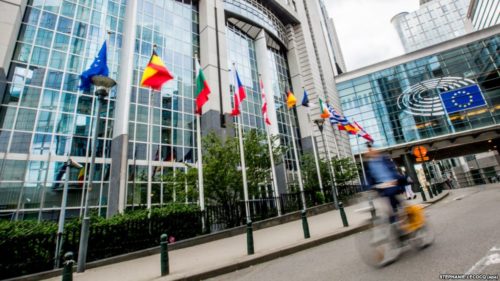What’s Love Got to Do with It?
A Red-Brown alliance in the European Parliament

Credit: European Parliament
Last week, the European Parliament Plenary has shown us something that was being pretty much well-known to anyone that has been following European affairs in the past couple of years. Despite the focus on The Netherlands Prime Minister Mark Rutte, and his conservative-liberal and cautiously delivered speech on the future of the EU, there was a vote on a resolution concerning Russia and the case of the Ukrainian political prisoner Oleg Sentsov. Although Russia has been trying to clear up its image with the ongoing World Cup (having in mind how often sports are a soft power in politics), the Members of the European Parliament have focused on the case of Oleg Sentsov, a Ukranian filmmaker that lived in Crimea and was sentenced to 20 years of prison by the Russian authorities.
The resolution was adopted with a large majority (485 MEPs) and a strong support from all the main political groups. However, the website Tango Noir, which monitors pro-Putin activities, especially from fringe and far right EU parties, has provided us with a full list of MEPs that voted against the resolution.[1] It is interesting that here we can see the “usual suspects”, coming from political movements that are often-times accused of being apologetic to the Putin regime. The Eurosceptic MEPs ranging from the Czech communists to the French far right, whose new name we still have to grasp, have proven once again their anti-EU stance.
Maybe the best example here would be the case of Jean-Luc Mélenchon, who famously refused to support the pro-EU candidate Emmanuel Macron over Marine Le Pen in last year’s 2nd round of French Presidential Elections. Many people from the historically-strong French left, including some of my friends, were utterly disgusted with that move. Hence, the MEP of his party La France Insoumise did not have a problem to vote exactly the same on this issue, as his colleagues from the French far right. We can see a similar example in Germany. Months ago, ahead of the German elections, which ended with strong gains from the anti-EU AfD, I wrote how on certain topics the German far left and far right are getting very close. This case is another example of this, as Die Linke members did not have a problem to vote against the resolution with their colleague from the AfD.

Credit: EPA/Stephanie LeCocq
Provocative coalitions like these show us a couple of things. First of all, it shows us that the Putin regime is very much lobbying inside the EU institutions, and forging alliances, which range from subtle flirting, to having “brotherly party relations” as in the case of the far right Freedom Party of Austria. As it is very well-known, the Austrian far right is a junior coalition partner in Austria for the last six months, controlling very influential ministries, and will influence the Austrian EU Presidency, which is starting in 10 days. The newest example is Italy, where the new government of the Five Star Movement and Lega is shocking Europe on a regular basis. They have already announced that they are in favour of abolishing sanctions to Russia. This is causing a grave concern for Europe, as these parties are completely exploiting the migration issue and lucidly using social media to promote policies that the Kremlin would definitely support.
The main problem are the upcoming EU elections. So far, the European Commission and the European Parliament have been the most vocal advocates of rule of law, human rights, and provided support to the people of Ukraine. It is expected that the Eurosceptic parties will perform very well in the upcoming elections, and it is now really the last possible moment to take this issue seriously and to save what can be saved. First and foremost, the European unity.
[1] http://www.tango-noir.com/2018/06/16/full-list-of-members-of-the-european-parliament-who-voted-against-the-resolution-on-political-prisoners-in-russia/
